by Lynne Margolis.
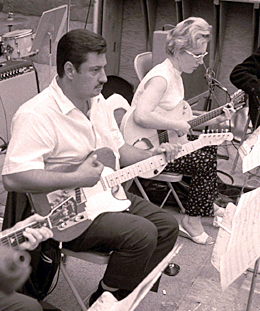 |
| Wrecking Crew members Tommy Tedesco and Carol Kaye in the studio |
In the heyday of ‘60s and ‘70s pop and rock, L.A.’s so-called Wrecking Crew dominated the airwaves, creating some of the most indelible sounds of the 20th century on some of the most beloved songs in the rock ‘n’ roll canon. Yet most people have no clue they even existed, these unsung session musicians who backed up everyone from Elvis, the Beach Boys and the Byrds to the Mamas & the Papas, Simon & Garfunkel and Frank and Nancy Sinatra. It’s a list so extensive, you have to see it to believe it. Drummer and Rock and Roll Hall of Famer Hal Blaine (one of the first sidemen inducted when the category was created) singlehandedly beat the skins on 40 No. 1 hits, plus seven Record of the Year Grammy winners – in a row; he played on eight altogether. Pianist Don Randi’s tally of artists he’s recorded with numbers 142; he’s been Nancy Sinatra’s keyboardist for 45 years. Phil Spector’s famed Wall of Sound? Created by the Wrecking Crew. The Beach Boys surfin’ safaris? Sometimes done with nary a Beach Boy in sight besides maestro Brian Wilson. The Monkees? Hey, hey, they were just acting chimpanzees. These cats were the daydream believers – and that’s what it felt like, they say. Living a dream. These 25 or 30 players rotated in and out of L.A. studios like the cast of a long-running Broadway show, and they loved, well, almost every minute of it. At the end of the day, though, they went home with just a paycheck and a sense of satisfaction. They never got credit on any album sleeve, and only a few – like Glen Campbell or Leon Russell, who struck out and found stardom on their own – would even be recognized on the street.
Denny Tedesco, the son of late Wrecking Crew guitarist Tommy Tedesco, decided 12 years ago to tell the story of these talented characters and their contributions to the soundtrack of our lives. During the South By Southwest Music & Media Festival in March of this year, Tedesco’s film, The Wrecking Crew, a rather remarkable chronicle, finally made its proud debut. It’s a loving portrait of a singular time in music history – as much about the beat goin’ on as the men (and woman: guitarist and bassist Carol Kaye) who made it. After the showing, I spoke with Denny Tedesco and original Wrecking Crew members Don Randi and Hal Blaine.
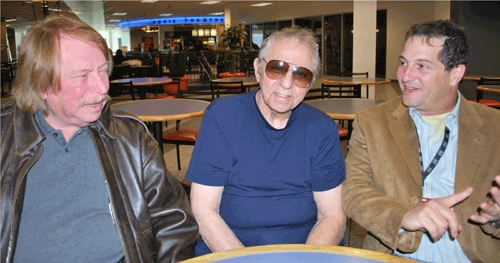 |
| (L-R) Don Randi, Hal Blaine and Denny Tedesco at SXSW 2008. Photo by Lynne Margolis. |
Lynne Margolis: It’s interesting, the Phil Spector part, everybody had said he was crazy, but Cher hilariously references it. She recorded her interview before (his homicide charge and trial)?
Denny Tedesco: Everything about that was before.
Margolis: Was that clips from other interviews?
Tedesco: No, no, no, that’s all original. We did that about 10 years ago.
Margolis (to Hal Blaine and Don Randi): What was it like working with him? Did he ever threaten you bodily or anything like that?
Don Randi: Never. I never saw a gun the whole time we were there. We knew how stupid and kooky he could get, but there was never any of that. I never saw it.
Hal Blaine: I never saw a gun ever.
Margolis: Were there any other producers you felt uncomfortable working with?
Blaine: I don’t think so. If you love what you’re doing, it’s not work, first of all.
Randi: Can you imagine having a job that you studied to do and that you enjoy doing, and then you get eight other guys that are with you, and are equally enjoying what you’re doing, and when all the sudden, it comes together, there’s no feeling like that. It’s just a wonderful thing and everybody gets that little smile, like, you know you made a hit record.
Tedesco: There was a great line from Glen Campbell, which isn’t in the movie, but he said, “It’s like playing with the Chicago Bulls, and everybody’s a Michael Jordan.” And that was the thing with you guys. If you couldn’t play, you weren’t there. So everybody was a player.
Blaine: Right, you wouldn’t have been called if you couldn’t do (it).
Randi: And for me, especially on the Phil Spector dates, here I am with my buddy Leon Russell, with my buddy Al DeLory, with Mike Rubini, Michael Spencer, there’s four or five of us …
Blaine: Larry Knechtel.
Randi: Larry Knechtel – playing piano, and there’s no competition. Everybody’s enjoying it, because that’s our job.
Margolis: You sort of touched on it in the movie when Glen Campbell became a star, and Leon Russell … but were there any tinges of professional jealousy? Or you all figured “Hey, if I wanted it I’d go get it but that wouldn’t be me” or what?
Randi: It never bothered me because I always had albums out under my own name also, as a matter of fact, that all the guys played on. It was fun for me and I wished them the very best. Just for me to say I worked with Hal. I worked with Tommy Tedesco. And that’s the joy of the world.
Blaine: But you gotta remember that Don Randi owned a nightclub. And so he was playing a lot in his own nightclub.
Margolis: What was the name of the nightclub?
Both: The Baked Potato.
Tedesco: It’s still there. It’s amazing; it’s one of the few nightclubs (still open from that era).
Margolis: How long has it been open?
Randi: Thirty-eight years now.
Margolis: Thirty-eight years and you haven’t sold it or had it torched or anything?
Blaine: If he sold it he’d have over $100 in the bank. [Laughter.]
Margolis: That’s what I hear. So you had seven records of the year in a row? How many total?
Blaine: Eight.
Margolis: Can you name ‘em off the top of your head?
Blaine: Well, the first one was “A Taste of Honey.” Herb Alpert, which you saw in the movie. I forget the years now. … “Bridge Over Troubled Water.” “Mrs. Robinson,” from the movie (The Graduate). That was also an Academy Award(-winning) movie, and soundtrack.
Tedesco: “Love Will Keep Us Together.”
Blaine: Hello, “Love Will Keep Us Together.” That was the last one.
Tedesco: “Up, Up and Away.”
Blaine: “Up, Up and Away.” I was just gonna say. And “Aquarius” [sings] “Let the sun, the sun shine in.” There was something by David Cassidy, I think.
Margolis: “Hair?”
All three: No.
Blaine: Was it “Misty?”
Tedesco: No.
Blaine: [sings] “Misty is the word I call …”
Margolis: “Windy!”
Tedesco: “Windy.”
Randi: That’s “Windy.”
Tedesco: “Cherish!”
Randi: That’s “Cherish.”
B&R:: “Cherish.”
Blaine: Absolutely.
Margolis: I had never heard that story about the Mamas & the Papas.
Tedesco: Which one?
Margolis: That Barry McGuire brought the song to (producer Lou Adler, intending to have the band sing backup to his lead).
Randi: Oh yeah. Because I played on “Eve of Destruction” …
Blaine: Right. We all did.
Randi: And I remembered he wasn’t too happy about it, either.
Tedesco: I’ll bet he wasn’t.
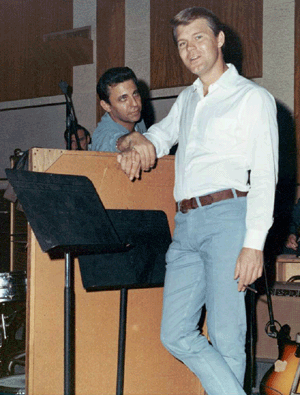 |
| Hal Blaine and Glen Campbell |
Margolis: Did he sue?
Tedesco: No, no because Lou was – did he write “California Dreamin’?”
Randi: Yeah, Barry.
Blaine: John Phillips.
Randi: John Phillips.
Tedesco: John Phillips wrote it.
Randi: But Barry found the song and he wanted them to sing background on it.
Margolis: But it wasn’t his song and therefore he couldn’t claim ownership and he couldn’t say anything.
Blaine: You know that Lou Adler is one of the biggest land barons in Malibu? He owns most of Malibu. Absolutely.
Margolis to Randi: You still have the club, and (to Blaine) you’ve been working pretty steadily, even after the (heydays), right?
Blaine: I’m knocking on wood … [raps knuckles on table]
Margolis: I see that.
Randi: Well, I still am, I’ve been with Nancy Sinatra for over 45 years, and in the beginning, when we all used to go out, it was a great, great time. And she doesn’t do as much anymore but it never stopped us working. we just did two shows at the NAMM show in Anaheim because somebody wanted us to do it. And it was a lot of fun.
Blaine: It was a lot of money, too [all laugh].
Margolis: Corporate shows are pretty nice.
Blaine: Let’s not beat around the bush.
Margolis: Now what do you think is gonna happen as a result of this film? Is this the first festival where it’s been shown?
Tedesco: This is the first. The first time it’s been seen other than by family and friends.
Blaine: Yeah, we’re hoping that it’s a gigantic hit for Denny so we can all get paid. [All laugh.]
Margolis: But do you think that worse things could happen than some sort of career resurgence; somebody would put you out together? This has happened previously with other films.
Randi: I’ll tell you what, it wouldn’t bother us at all. We still have all our faculties, we still can play – perhaps a little better than ever, you know? [Laughs.] The age hasn’t hurt us at all.
Blaine: But that’s the key word there. Age. They don’t want the altecockers around, they want the young, vibrant, you know …
Randi: Unless they want that ‘60s sound, or that ‘70s sound or that ‘80s sound
Blaine: Well, that’s why they hire us now.
Margolis: You’d be surprised how many people are out there who want to hear what you guys do. Those songs are the soundtrack to so many millions of people’s lives.
Blaine: They really are.
Margolis: They are. They’re so significant.
Randi: Hey, they’re still goin’ 30, 40, 50 years.
Margolis: Exactly. Like Carol said, who thought they’d be dancing to it 20 years later?
Randi: Well, what’s wonderful is to see that basically, if the grandparents liked that music, their kids did, and now you’re seeing the grandchildren, so you’re getting three and four generations of people that wanna know about that music.
Blaine: That’s why it’s important for this film to get out there [knocks on table again], for the world to see it.
Tedesco: I said to someone the other day, if a painter has to learn about Picasso, why won’t a 16-year-old kid learn about these guys? These guys … built things, and they built upon it and everybody keeps going on building.
Blaine: We’re all architects, I guess.
Randi: When his father would play at the Baked Potato, the place would be sold out, packed, and most of the people that were there to see Tommy Tedesco, I’d say were under the age of 20 … they know what a master musician is and they can absorb something of that. And we’re all ahead because maybe one day we’ll have to play with those kids. And they’ll know what the hell they’re doin’.
Blaine: With all due respect to Tommy, and we all love him, the potatoes were delicious! [More laughs.]
Margolis: You didn’t say much about Barney Kessell in the movie. Was that because his style was somewhat similar to your dad’s?
Tedesco: No. Not necessarily. I mean, Barney was really on the fringes at that point, too. Barney was a straight-ahead cat, even though he was involved more with that Spector stuff.
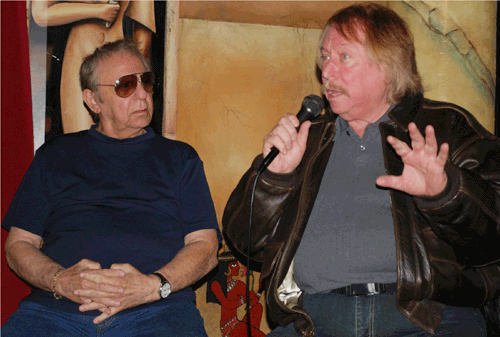 |
| Hal Blaine and Don Randi. Photo by Lynne Margolis. |
Blaine: He was a jazz player.
Tedesco: That’s what I’m saying. The rock thing …
Randi: There were certain guys that would prefer not to have done that.
Tedesco: Exactly.
Randi: And I think Barney might have been one of those. And Howard (Roberts), too.
Tedesco: That’s what I mean.
Randi: It wasn’t that they poo-poohed it. But they preferred playing be-bop.
Tedesco: And Barney was an established jazz guy. My father called himself a frustrated jazz player. And a lot of those guys – I mean, I can’t speak for you guys, but they would have loved to make a living playing jazz, but you couldn’t in L.A. It’s very difficult. Like, he’s got the only club that’s left. That’s been there that long.
Randi: Sure. And we started many, many years ago. I’ll tell a great story. I’m on a recording date with Tommy and there’s a young player; it’s his first date. But there were two of ‘em, one of ‘em was Jay Graden (Aretha Franklin, Steely Dan), who later became a big producer, but the other guitar player was Lee Ritenour. And Tommy helped Lee get started as a recording musician, before he went on his own. And Larry Carlton, both of ‘em.
Margolis: If you guys could pick one artist, one song that you loved the most, which one would it be?
Randi: Very hard to do.
Blaine: Like, which child do you like best.
Tedesco: My parents loved me the best. [All laugh.]
Randi: I’m sure we could say, at one point, that was the best one. And then you go another year later, and that was the best. Because you could probably say for that year, it was the best, like the year “(You’ve Lost That) Lovin’ Feelin’” came out. I always loved “Help me, Rhonda,” by the Beach Boys. That was always one of my favorites. That was one of the few times, I felt, we sat down right after we played it and knew, one time through, this is a hit record. I’m on another hit. Because it was instant, and that was a lot of fun.
Blaine: We were all greedy for gold records. [Denny laughs]. I’m serious. And they were piling on awards to us, gold and platinum awards. Cause they sold so many records. And in those days, the record companies – there are no more record companies, very few – in those days, the record companies paid for all that stuff. You want a gold star in Hollywood, they’ll buy you one. I mean, you’re makin’ them zillions of dollars, why wouldn’t they spend 25 grand?
Randi: Hal and I were very fortunate. Because of Tommy Tedesco, we all got inducted into the Musicians Hall of Fame (as part of the inaugural group of inductees in November 2007). At the museum in Nashville, and it was quite a function, and we almost didn’t go because we didn’t know what it was gonna be like, and it turned out to be wonderful. So recognition, you know, as much as we do, we don’t really need it, but it’s wonderful.
Blaine: We all have egos.
[We talk about how much ghosting went on and Texas legends like Doug Sahm, who hit big with his fake British Invasion group, the Sir Douglas Quintet.]
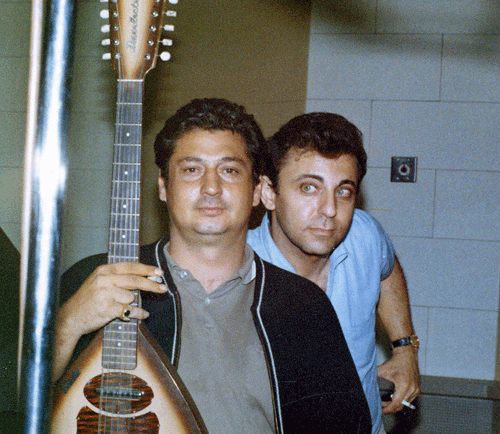 |
| Tommy Tedesco and Hal Blaine |
Blaine: One of the things you learn, especially in Texas … I learned a long time ago, you can always tell a Texan – but not very much. [More laughter.]
Margolis: You guys are the best joke tellers.
Tedesco: Thank you.
Randi: That’s part of the Wrecking Crew’s secret, because when a producer would start getting really intense and everything, these guys, Tommy and Hal and myself and everyone, they would cool this guy out so quick.
Tedesco: Yeah, they were ballbusters.
Tedesco: Like you said, if you love what you do, it’s great, but it’s like all of us. There’s nothing worse than going to work and hating your job, and these guys didn’t do that.
Blaine: It’s not work. When you love what you’re doing, it’s not work.
Margolis: So would you call yourselves semi-retired?
Randi: No.
Margolis: That’s right, you still have a club.
Randi: Well, I’m also playing all the time. He is, too. I force him.
Blaine: That’s the truth.
Randi: Now, we’re gonna ask you a question. Don’t you think the music, the compositions, the songs you listened to (in the ‘60s) were a lot better then than they are now?
Margolis: I would have to say they were tighter. There was more musicality in a lot of cases. But I also think that you can’t discount the fact that with the rise of rock ‘n’ roll, when singer-songwriters played their own songs, there’s something to be said for that as well. But to be able to manufacture one hit after another after another, that’s a talent that nobody’s been able to equal except some hip-hop producers with sampling.
Blaine: Well, we would go from rock to country to jazz to pop to television shows to commercials.
Margolis: The difference is that they are manufactured half the time.
Randi: The younger musicians now, not to take anything away from them, they do one thing really great. Like I’m an acid rock guitar player. Or I’m a rhythm guitar player. But all those guitarists, all those pianists, the drummers, if somebody said, “You know what, I don’t like that rock feeling, can we try it with another feeling?” you have to be able to say, OK, you can do it.
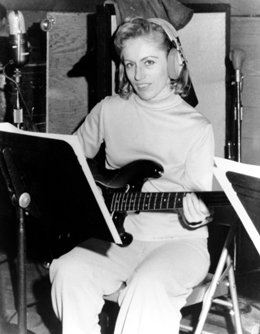 |
| Carol Kaye in the studio |
Margolis: You know some musicians are so versatile, they can play anything, but it’s very rare. And they need to have a place to fall into these days.
Randi: I remember I was doing a seminar somewhere, and some kid tells me, “I want to know about being a studio musician,” and I can nail ‘em immediately because they listen to one radio station. I said, “You can’t listen to one radio station and survive in the studio. You’ve gotta be able to go through that whole radio, all those different radio (stations), and you’ve got to remember, you’re a clone. If somebody says I want that, they want it. You have to give it; they’re paying you for that.”
Randi: I have a question you should ask us.
Margolis: OK.
Randi: I’ll ask it for you. Hal, what was the favorite record that you didn’t play on?
Tedesco: Ooh, good one.
Blaine: There were many.
Randi: Pick one that you didn’t play on that you would have liked to have played on.
Tedesco: I know one that you said to me once.
Randi: I have one.
Tedesco: Oh, that one’s a good one. That’s right.
Blaine: “Lovin’ Feeling.” I didn’t do that one.
Tedesco: Earl Palmer did that one, that’s right.
Randi: Mine is “Bridge Over Troubled Water” that Larry Knechtel did. And you know, when we played it at the Nashville thing, before we played it, Larry says to me, “If Vince (Gill) sings it in another key, you’re playin’ it.” I said, “Like hell I am.” But it was so emotional. And I just sat there, and I started thinkin’, “That’s the record I would have liked to play on.”
Margolis: Now, when the crew was that big, was it more or less because somebody else was busy on some other gig that day? How was it dictated who played on what?
Blaine: Depends. Maybe I was out of town. I remember getting called for “Classical Gas.” I was in London.
Tedesco: And Jim Gordon got it.
Blaine: And all these years later, I’m doin’ symphony concerts with Mason Williams, and I’m playing it all the time. Great record.
Margolis: And now you could have just recorded it and sent it [all chuckle]. But still, it’s not the same as doing it live.
Randi: We were so fortunate to have it – you know, people wanted us and we were in demand and we came through for them. And we became part of a scene that will never be repeated. It will never be done again.
Blaine: Well, it was absolutely the golden era of recording of music.
Margolis: It sure was. Do you think the Beatles were the ones who sort of made that go away?
Blaine: They were our biggest fans. The Beatles loved our stuff. I worked with all the Beatles.
Randi: And the Stones, too. Charlie Watts – I mean, Hal Blaine is like (a god to him).
Blaine: They came to my house, the Stones.
Margolis: They were also (among) the first ones who were actually doing their own music. That became the future of rock; that was my point.
Randi: Yes. But you know, (there’s) an interesting thing that Henry Mancini said about the Stones. This is years ago, we all went to a NARAS meeting when I belonged to NARAS, and he said, “I think the Stones are gonna be around longer than the Beatles [laughs].” Yeah …
Blaine: Well a rolling stone, you know.
Margolis: Gathers no moss. (To Denny) How much footage did you leave behind?
Tedesco: Oh, a lot. There’s whole story lines, like Don talks about different things. That’s the unfortunate thing, because there were, like, whole historical pieces that Don talks about, Snuff Garrett talkes about … there’s hundreds of hours. Thank god for the DVD.
Randi: I was tellin’ his mom, I said, “Had I done this film, it would have been 20 hours long.”
Tedesco: The first cut was over two hours. And it was like, “Whadda you mean I gotta cut? I can’t!”
Margolis: Were you involved in doing films before this?
Tedesco: Yeah, I’m a commercial producer. I produce commercials. But I’ve learned how to deal with this.
Margolis: Are you gonna tell us how much the (song) clearances cost?
Tedesco: Not yet, but I gotta say, the record companies have been very helpful. Once some jumped on, then the others came through. One company, Warner Bros., said, “Listen, we’re not gonna mess with ya.” He says, “It’s not about a chicken coop, it’s about the music. It’s about our business.” And they were very helpful. But you gotta get ‘em – you know, there’s 140 cues, there’s 120 songs, I think, in this film, and 99 percent of this music that’s in there? They’re on it. There’s only two cues that they’re not on – one is the stripper club, which is stock footage, and the other thing is the Platters. It was so ironic; I don’t know if I told you this (to Blaine and Randi) – when I needed Dixieland music for them to play under Plas Johnson? I called Conrad Janus up. I don’t know if you remember Conrad. He was the father in “Mork and Mindy.”
Randi: He had the Beverly-Hills-something jazz society.
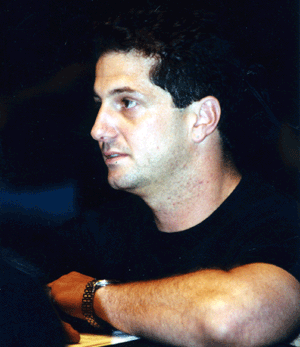 |
| Denny Tedesco. Photo by Aaron Walton. |
Tedesco: Yeah, exactly. So I call Conrad up, I says, “Conrad, I need some Dixieland music.” He says, “I got some. What’s it for?” I told him what it’s for; he says, “Well, I got an album that Plas is on.” I said, “Get outta here.” So I used that to play under Plas and he’s on it! I’m so excited about it.
Margolis: I have to say the best thing is that you guys were the antidote to the “beautiful music” (format) station that my father liked to listen to.
Tedesco: I don’t know if you noticed the credits at the end with the songs. Obviously, there’s a lot of songs, but it was the first time – did you see all the names of the musicians? I took their names from all the contracts with these guys, so it was like the first time anybody ever got credit for any of these songs. It was really fun.
Margolis: I think this movie is going to be a hit. It’s just like the movie with the guys who worked with the Temptations (and) the guys from Soulsville. The Stax players.
Tedesco: The Funk Brothers.
Randi: You know what’s amazing? That it’s all true. There’s no BS in any of that film. This is what happened. This is the way it was. And it’s a labor of love for Denny.
Tedesco: And I was a fact-checker.
Margolis: There’s nothing like doing it live in the studio, is there?
Randi: No.
Blaine: It’s great. Live is always wonderful.
Related Links
Wrecking Crew
Musicians Hall of Fame
Hal Blaine
Don Randi